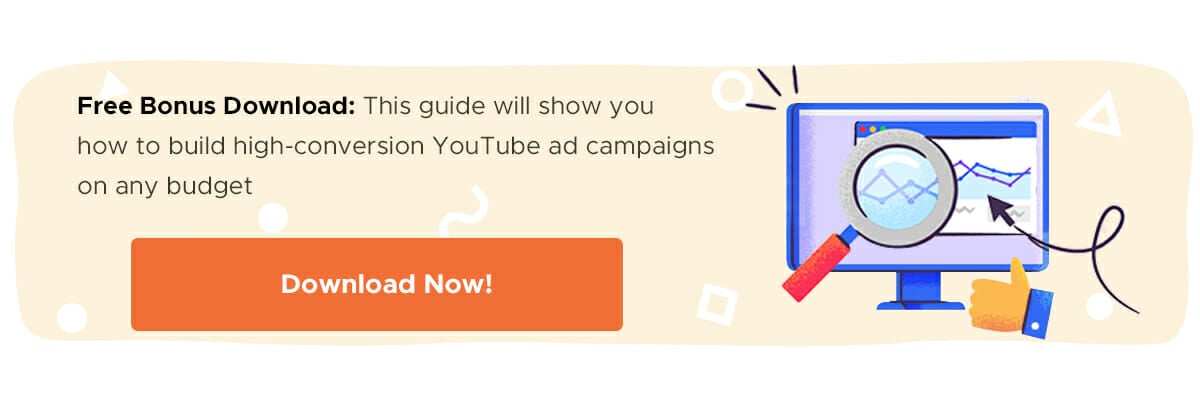If you’re in business, customer acquisition and retention is one of the most important things for your company. Getting new customers and having returning ones through positive customer experience can make or break your revenue. We’ll be looking at the newest customer acquisition trends, analytics and much more.
Let’s say you’re looking at the data coming in through your website, and your site is getting anywhere from a few thousand hits a month up to 30,000 visits a month. What if only 1-2% of those thousands of people turn into a lead and, at most, just 1-2% go from a lead to a sale?
Those numbers are terrible so I hope this isn’t the case for your business. If it is, good on you for doing the research needed to improve those numbers. You need to figure out what is happening to the other 98-99% of people visiting your site. Ask yourself: why aren’t the visitors turning into leads? And how can I turn the leads I do have into sales?
Let’s go over some of the best customer acquisition tactics you can use and beyond.
Turning Leads into Sales
No matter what your numbers are, turning leads into sales is one of the main points of owning a business. There are some simple things that can help you if you’re trying to increase those numbers in terms of customer success.
A tool I like to use is called Clearbit, a marketing data engine for customer interactions, which helps you with a variety of different stages in your business:
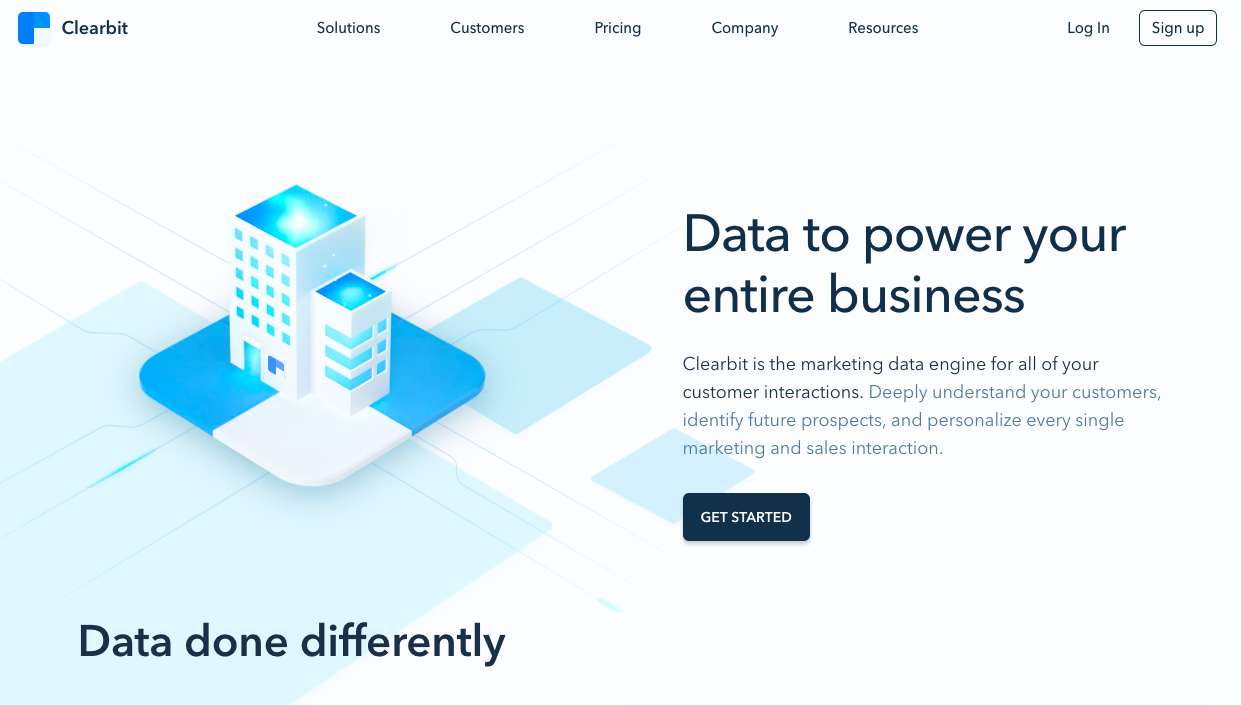
Another great (and free!) data-centric tool is Google Analytics. Once you have that, you can enrich it by combining it with a customer information site such as Hull.io or Segment:
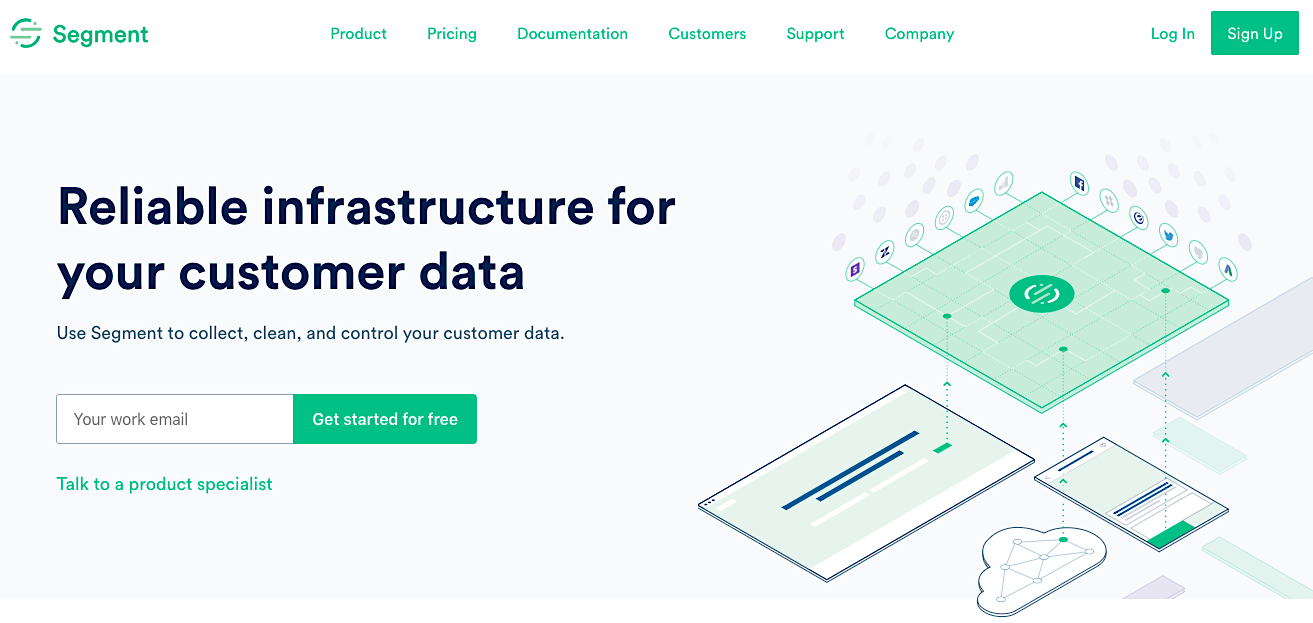
Put together all your information from different contrasting origins into a single area and it’ll be much easier to see how the people visiting your site react to it all. You can see which pages they visited or bought from, making it much easier to curate their experience.
Let’s use Coca Cola, for example. Coke visits your site after you’ve enriched the data, you learn who is on their marketing team, and gather an email list so you can start running dynamic, targeting ads on YouTube or Instagram. This will easily turn leads into sales.
This may seem advanced and even sneaky, but with the world entering the age of artificial intelligence, I believe everything is all about data and information. Your search engine has the data, social media accounts have the data and we all know our phones have the data. If you can incorporate this data into your website, you’re that much more in control. You and your team will be able to use more effective marketing to drive prospects to the point of sale, in a way that feels more natural to the buyer.
Learn More:
- How Artificial Intelligence Is Revolutionizing the Digital Marketing Sphere
- How to Write Lead Nurturing Content: 7 Proven Tactics
- How Correctly Used Pop-Ups Can Help Increase Leads
What if I Don’t Have any Traffic?
Now, you may be reading this and saying to yourself, “But Eric, I don’t have any traffic to begin with!” That is okay. One of the best things you can do to increase traffic is create content.
Create a piece of content that works really well for your business. If I were starting all over today, knowing what I know, and I had no audience, I think I’d go live on a social media platform – whether that’s YouTube, Facebook, Instagram or wherever – and upload the videos so people can watch them after you’re done streaming.
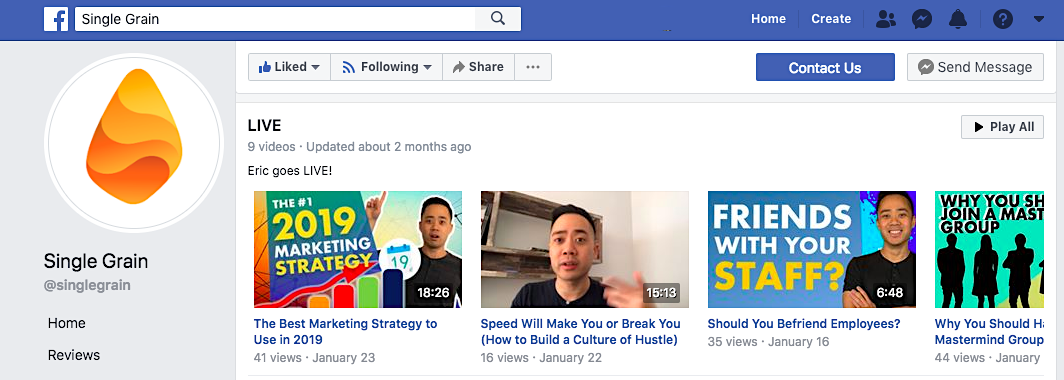
An example of that is: “I’m going to broadcast on Facebook and YouTube right now because the people watching those streams will help grow my audience.” I see more traffic on Facebook than YouTube, but that can change for the individual. If 25-50% of the people watching those videos are interested, then I will re-target them by making an offer. An offer can be a simple thing, like telling them to like my page or subscribe to my channel. Those are easy ways to start building that relationship.
As for my YouTube channel right now, I have 17,000 subscribers, which isn’t amazing but it’s great because it allows me to engage with more people who are trying to start a business or have marketing questions versus bigger channels that post less engaging content:
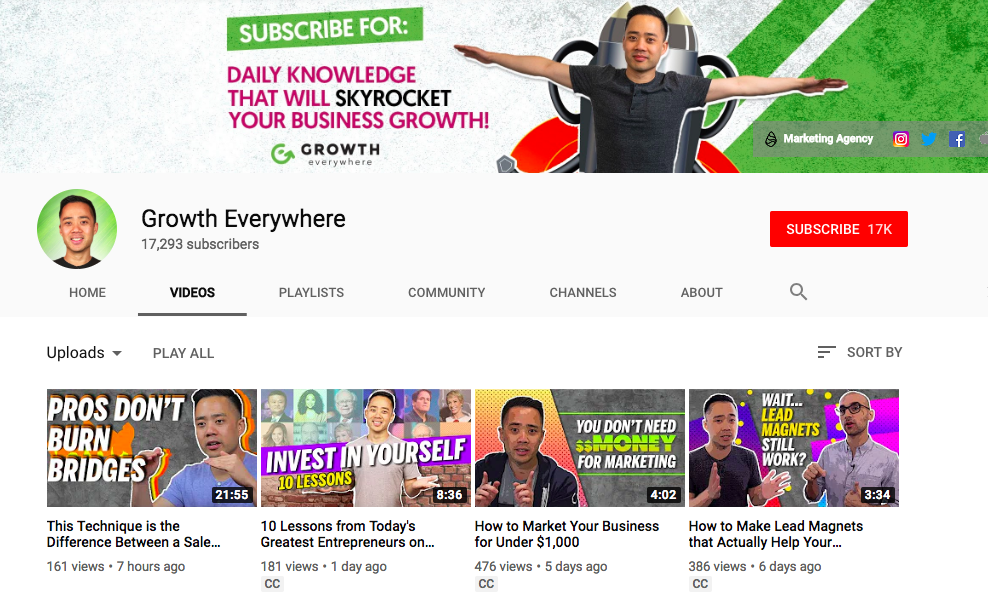
Who Should I Target?
As I just said, bigger isn’t always better. It’s about targeting the right people, not the number of people. Look at competitors and see who’s subscribed to their YouTube channel, see who’s following their Instagram or Facebook page. After doing that, you are able to create ads directed specifically toward the target audience and traffic you want driving to your business.
You will be able to create a working system over time and once you have revenue coming in, you could invest that money into what’s called content strategy, or even podcast strategizing.
Podcasts – the Overlooked Marketing Avenue
Believe it or not, podcasting is a very underpriced content avenue right now. I believe in the last year there was a timeframe in which, over a one-month period, 20 million new listeners came on. That is a great place to have your foot in the door and is quite overlooked when it comes to marketing.
If you want to know more on that, there is a website called Chartable you can look into:
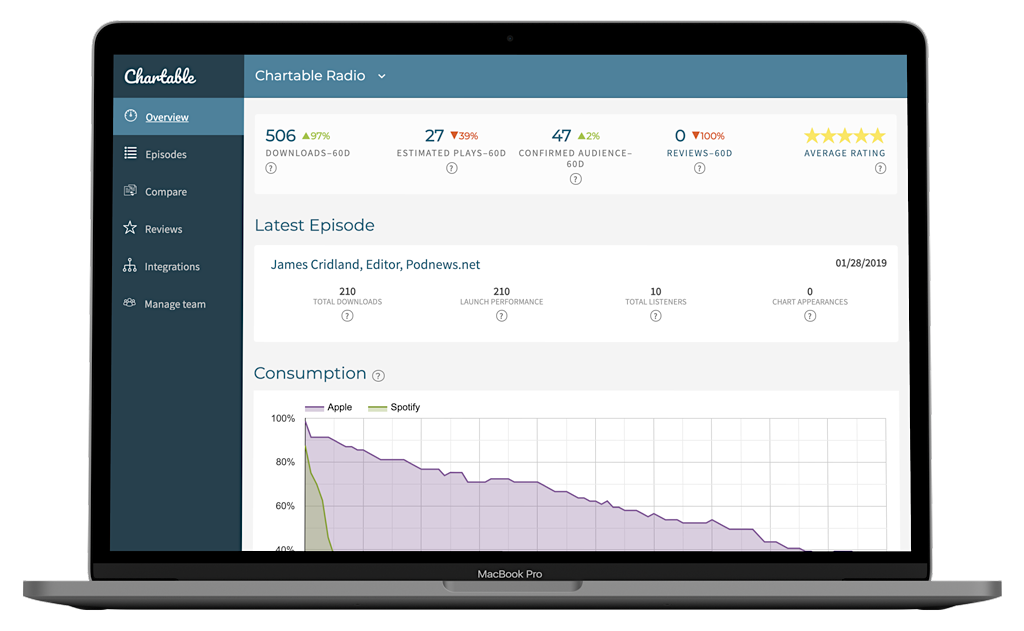
You can actually see how our Marketing School podcast ranks and how the Growth Everywhere podcast ranks. This is the basis of creating some form of content.
Also, in my opinion, it’s not too difficult to start a podcast. The average podcast might get a few hundred downloads every month, but if you’re putting out engaging content daily or weekly, you will start to see some growth. With Growth Everywhere, we post daily for that exact reason.
Learn More:
- How We Built the Growth Everywhere Podcast to 109,000 Listens per Month
- The Ultimate Guide to Podcast Advertising
- Why I Decided to Start Podcasting
Repurposing Your Content
You can take things you’ve already created, like your livestream videos, and basically just turn those into podcast episodes. We did this and our number of downloads doubled in a month. Did you know that Spotify spent $340 million buying podcast startups? These big businesses are getting seriously into it.
If you Google “podcast advertising,” you can learn a lot about not only how to start a podcast, but how to start advertising within a podcast if you’re at that stage. We already have enterprise companies reaching out to us for help with podcast advertising, so it very much is a market that exists.
If you’re giving your audience value in your daily content, they’re more likely to listen to your ads. I do this with my videos. I’ll mention something like singlegrain.com/live (to book a call to see how we can help you build your own super-successful agency) and it’s easier for people to stomach because I’m giving them value throughout my videos.
Going Live Options
We briefly went over this before, but you have several options of going live. Here are some of the more popular options:
- Facebook Live
- Instagram Live
- LinkedIn Live (it’s new, check it out!)
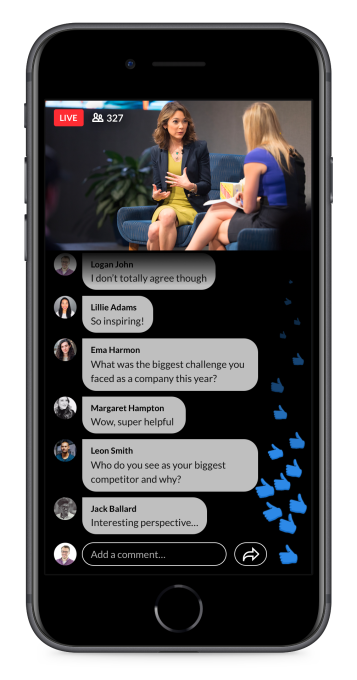
- YouTube Live
- Periscope (Twitter’s live)
With so many options available, you really have no reason not to get started somewhere.
My Live Event
Neil Patel (whom I do the Marketing School podcast with) and I did a live event in downtown Los Angeles in Q2 last year. We only opened this to 500 people and tickets were limited (FOMO, anyone?).
We have been asked by several people, so we are including a VIP meal with me and Neil. It won’t be cheap, probably a couple thousand bucks, but if you can get value from it, then it’s worth it.
It will essentially be a group of exceptional entrepreneurs and marketers. Instead of just being online telling you to buy a product, you get the chance to meet in person and will be able to start relationships, which makes it much better, as most people like to do business with other people in person.
Content Sprouting
You may not have heard of content sprouting, but it has been really popular this year and there’s a reason for it: it’s working really well. So, what is it? Basically, it is where you seed a piece of content, whether that’s a video like what I do on my channel and live streams, and you sprout multiple pieces, like a series.
I find myself talking about several different topics during a live stream session and I could, and often do, take each of those individual topics and make several videos for them. The same thing could work for blog posts as well. If you do both, you can have over 30 pieces of content right there, and even more if you include podcasting, as we talked about earlier.
Now, if you think about your businesses’ social media posts on top of that, we’re talking Facebook, Instagram, Twitter, YouTube and so on. What can you do with all of that?
You could combine it all into a giant pillar piece, but you can also make it easier to take on this omnichannel approach, or what I’m calling “content sprouting” approach, where you take your multiple pieces of content and “pollinate” them by promoting them on multiple channels. Whether that’s running ads, reaching out to people via your email list, whatever way you do it, but the point is that it’s a more holistic approach and showing that you’re not just a one-trick pony.
Dive Deeper:
- The #1 Marketing Strategy: The Content Sprout Method
- Omnichannel Marketing: Using the Content Sprout Method to Overcome Info Overload
- [Case Study] The Content Sprout Method: How to Use Strategic Content Marketing to Grow Your Traffic From 0 to Millions
Visual Marketing
If you have a business that’s more visual, like photography or graphic design, consider which platforms are visual out there. You have Instagram, Pinterest and YouTube, and they are great options. However, maybe you’d like to specifically target someone like, let’s say, interior designers.
That’s when you post on specific sites that interior designers would be on, like Houzz:
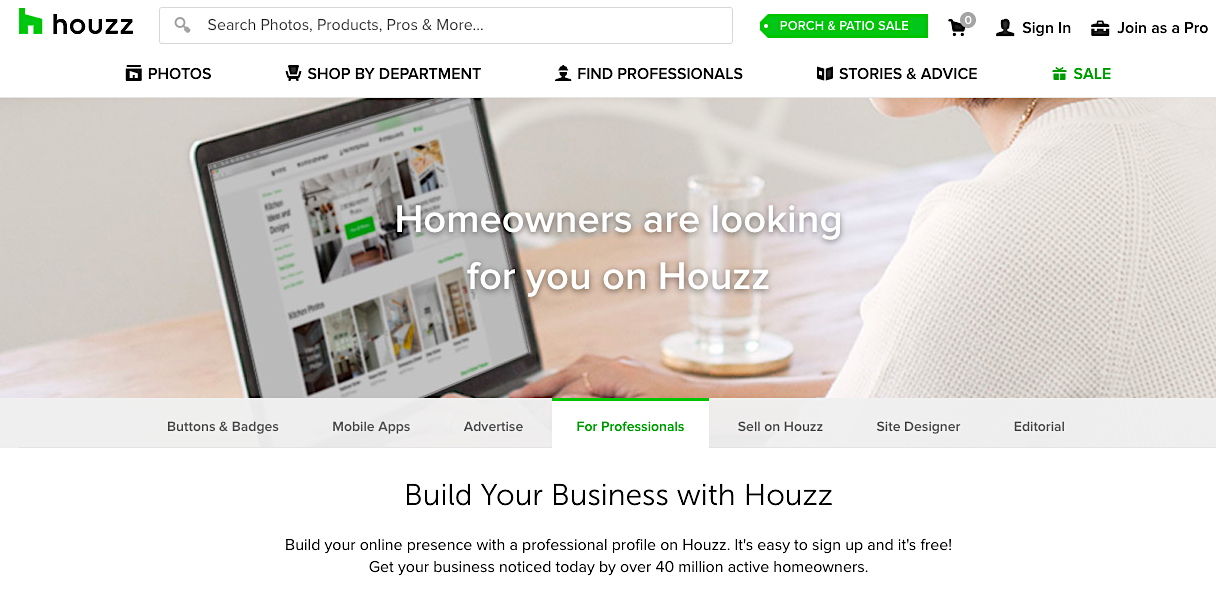
You need to go where your target audience is hanging out, and that doesn’t just mean the popular social media channels. You’ll be much more discoverable that way.
Maybe for you, it makes more sense to throw your work on a design platform like Dribbble, a platform to find and showcase your creative work. You just have to think about where your target market is hanging out online (or in person) because the customer acquisition you’ve read about so far only applies in certain areas.
And how are you going to handle in-person, local marketing when your work is visual? That’s another thing to consider. Where, physically, will your audience be hanging out? Will they be at a coffee shop, a craft store, a library or maybe a concert venue?
iPhone Analogy
I find myself thinking over and over again that when you purchase an iPhone, you won’t just use it for a few days then get rid of it, right? It’s still a perfectly working phone. You want to get the most out of it because we all know they’re not cheap. The phone I have now I’ve had for just over a year and I’m pretty sure that I won’t need to replace it for a few years. It is a really good phone and I don’t need to upgrade it any time soon.
The reason I’m saying this is for you to remember to make the most out of what you have. Whether that’s in the beginning when you only have time or later when your business is thriving and you have more resources.
Conferences and Meet-Ups
Something you may not know about me is that I’m a bit of an introvert. I really don’t like hanging out with people for extended periods of time. I need to be alone to recharge and would preferably like to do that at home. But I can promise you that nothing pushes things along quicker than doing things in person, which is why if you have no network or are just starting out, conferences can be a great place to start.
In fact, conferences, local meet-ups and marketing groups are all great. When I got those recommendations when I was first starting out, I sort of dismissed them. I thought to myself, “I don’t want to go to a local meet-up.” I was just making excuses for myself. Even if the people at the meet-ups have been in business ten years longer than you and have much more experience, the chance of meeting just one potential connection is worth it to go, I promise.
I had to start asking myself how many more excuses was I going to make? Why don’t you just go out there and do it? It seems like nobody wants to talk to you. Nobody thinks they can get anything from you. But then you have to remember to ask yourself from time to time when things aren’t going swimmingly: “How do you think all of these other people got started?”
There’s no excuse. If you’re reading this right now, it means that you do want to get better. You have to ask yourself: “What is going to set you apart from all those other people if you actually start to take action?” Whether it’s going out there, networking, doing the things that you don’t want to do or building relationships with other people, it’s going to go way further than just staying online. This is something that so many business owners forget about.
Here’s a pic of a fireside chat I did with Jumpcut CEO Kong Pham – a great crowd with people who were there to learn:
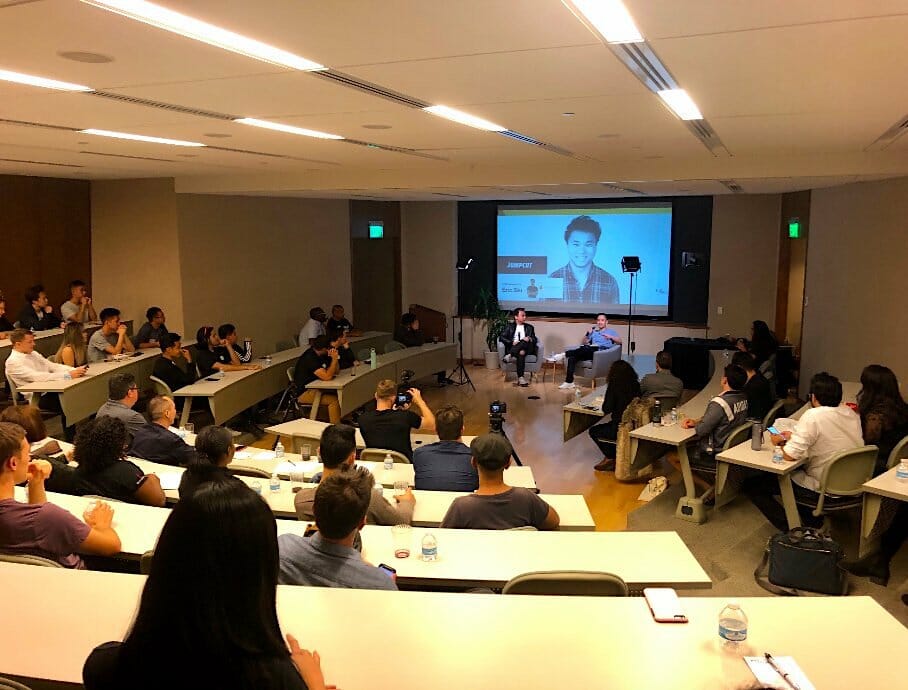
You can stay online, you can just try to run ads, but I’m telling you, the in-person connection will change your business. The thing that people forget about when it comes to ads is that making them work for a long period of time is not as easy as you think it is. Sometimes, it might take a couple of weeks or a couple of months. Believe it or not, it can take even longer for it to start to ramp up. Remember what I said about our blog post numbers?
What you’re trying to do is build a formula. Now, if everyone could build a formula that works well, everyone would be really rich. Everyone would be extremely successful and things would be a ton more competitive. There’s a reason why not everyone is extremely successful and that’s something to keep in mind.
Now, on to some of the common questions that people have been asking me.
Frequently Asked Questions
These are some of the questions I’ve been asked during my Facebook Live videos, and I thought I’d share them with you, broken down into categories.
Customer Acquisition and What Works
Does offering services in a package help in B2B customer acquisition?
Yes, it does in my opinion. Here’s the main point to keep in mind: if you’re looking into getting (or maybe you already own) a services-based company and you can package things together, it will make it much easier for your client to understand. It doesn’t matter what size the packages are either.
Now, let’s say you’re selling a solution, a modification instead of just services. This will advance you quicker than other companies out there and even more so if they just offer services.
Now, you have to also think about customer acquisition here. What is working? Blogging does work but, boy, it can be really hard. Did you know there are over four million blogs posted each day (and that number changes by the second)? It can make you feel like you’re drowning in a sea of bloggers!
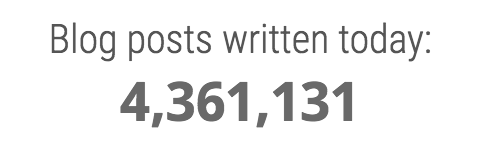
Before I started my position with Single Grain, the blog was getting a measly 4,000 hits a month. We continued trying to market our content like we had been doing, but I realized it was going to take two to four years to get some good, steady traffic with higher numbers coming in. And, as I predicted, recently the numbers have started to incline consistently. Remember that this is something that just takes time.
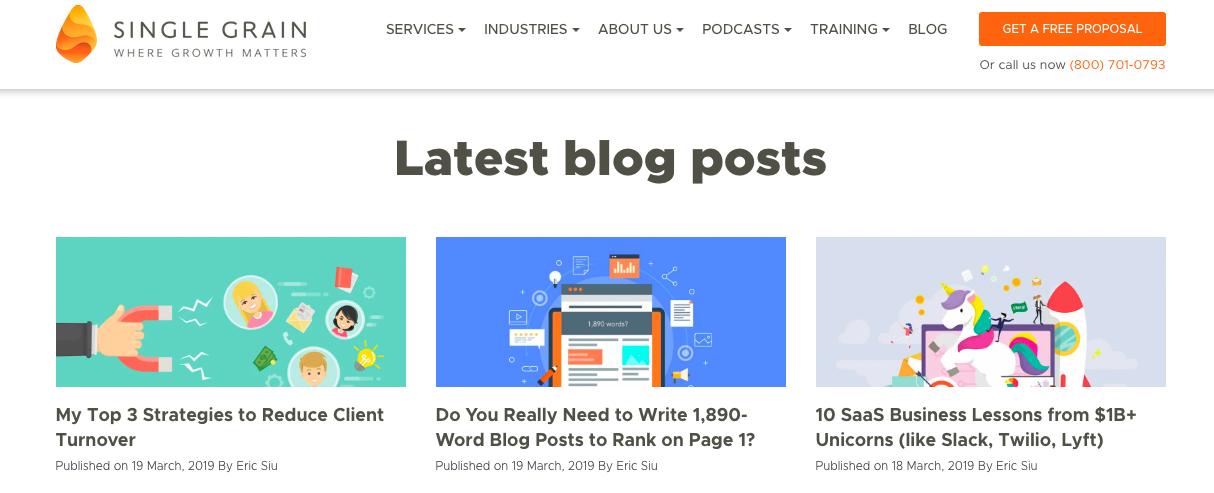
You will be stretched too thin if you try to dive into several areas at the beginning, and likely not succeed anywhere online because you need to be focused on one or two specific areas.
The attention and resources you have when you first begin are quite limited, but you will have plenty of time when you first start out. It’s more about how you’re spending your time rather than your resources when you’re starting out.
Learn More:
- 6 SEO Tactics for Maximum Customer Acquisition
- 3 Content Marketing Efforts to Improve Your Customer Acquisition Strategy
- Attention Marketing: 10 Tips to Acquire More Customers
Online vs Offline
When it comes to customer acquisition, what else works?
I like to think about online and offline. Consider going to dinner for meetings or live events. If you are an online-only business, you’re taking away a world of opportunity. It’s about the people. When you have good connections with them, they’ll introduce you to other people (i.e. networking).
This will turn into a cycle and you’ll find yourself making deals and partnerships that you would’ve missed out on had you just stayed online. Neil and I aren’t marketing that event ourselves. Instead, we hired an event organizer and we have sponsors to cover the cost, so we won’t be $50,000 to $100,000 out of pocket. We were able to find these people through the wonderful connections we’ve made by attending in-person events over the years.
Setting Prices
Do you have recommendations on websites that have an option to pay for something like a Google Sheet?
Well, for starters, I hope you have some kind of email list set up or an audience to launch it first. What I would do before launching anything, in the beginning, is to add a link where they can PayPal you the money. That is how I’ve launched products in the past, whether that was a course or a software product.
You can write an email saying something along the lines of “Hey, we’re testing this out right now. The course (or whatever your product happens to be) is X amount of money and if you give me half right now, I’ll give you 50% off the other half. If you’re interested in this, PayPal me right now.”
When people already trust you, they will actually do it. I’ve benefited from a lot of pre-sales this way. The problem is, a lot of people are going to think you have a really great idea but won’t take out their wallets and pay you. If they don’t pay you, then what’s the point? If you can get those pre-sales rolling in, that’s great. Also, I would suggest not running ads on it, unless you’re looking for customer value.
If you still need to know customer value, start with your audience first and see how it comes out. Once you have your metrics and a formula, put it into an Excel sheet where you can scale it out and make it more predictable and that’s when you can start to think about these other channels.
The other thing with customer acquisition is that you have to think about how you’re going to have a multi-touch attribution type of funnel. People won’t be just looking at you on one of your channels. They’ll probably check out multiple channels, whether you have three or 14.
A lot of the people who buy from us tell us that they found us on our blog first. Maybe they’ll catch us on YouTube after that and then watch a livestream. Or they’ll watch a webinar and eventually we’ll meet in person. There are so many different touch points.
Maybe the timing won’t be right and they might not buy from us until six months later. A tool like Wicked Reports is great for small businesses:
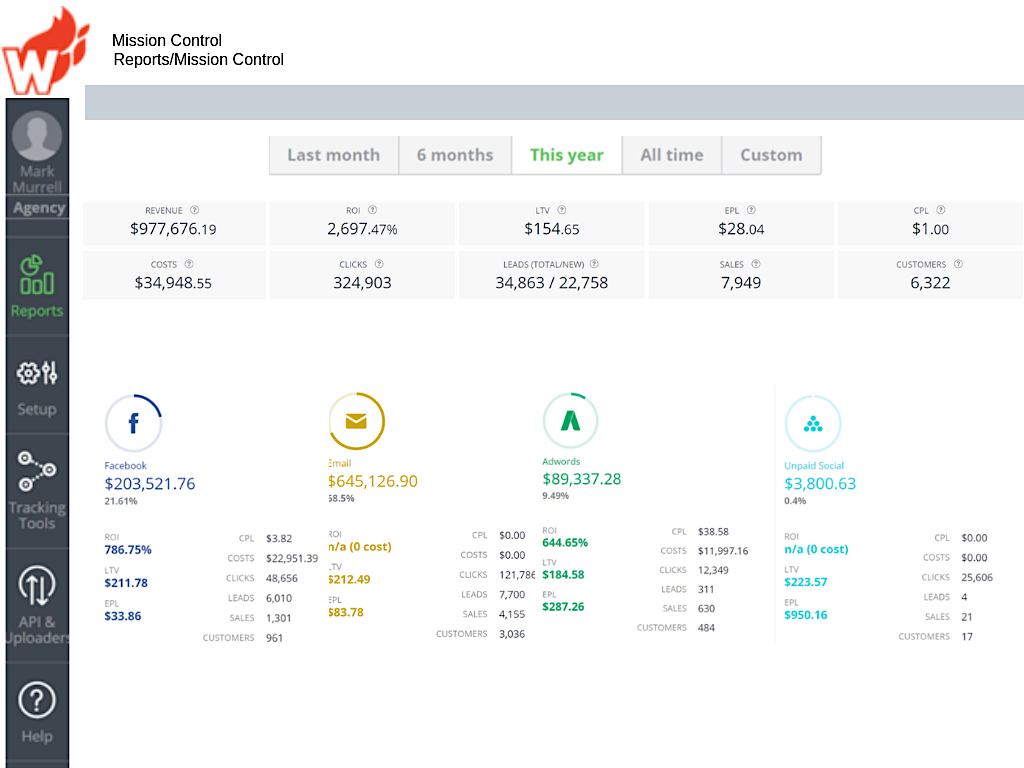
You’re able to see that if your campaign doesn’t perform well in the first month, it might perform six months later. Then you could get a six-month ROI instead of just giving up on the campaign after only a month.
Dive Deeper: Why You Should Use Multiple Channels to Maximize Your Customer Acquisition
Starting from Nothing
If you are completely starting over, what is your strategy on getting the very first few clients?
If you don’t have anything in the beginning, – no content, no money to invest – there are still options for you. You can reach out to people and offer to work for free for a short bit of time and then maybe they’ll cut you a deal. Work for free for a few months or so, but make sure the contingency is that you negotiate something similar to a retainer if you come through on your good work.
In the beginning, if you have nothing, what you do have is time. If you have a lot of resources already, what you don’t have is time so that’s where that negotiation balance comes in.
Having Chat Bots
Does your firm charge when you have something like a messenger bot?
As for messenger chatbots, you charge them an initial fee and then add on to that. If you’re paying someone like ManyChat, MobileMonkey or Chatfuel, don’t forget to add on a maintenance fee. Those companies will charge you a monthly fee to manage it so you could charge more to handle it for them. You just have to figure out what prices work best for your business. I would suggest having a set-up fee first and then add in a monthly management fee.
Dive Deeper: Why Chatbots Are a Must-Have for Businesses (and How to Build One!)
Steps to Sprout Content
Do you have any content online that will help as a step-by-step guide for sprouting content?
Yes, we do have a YouTube channel with videos about the content sprout method. Or if reading is more your style, we do have longer, more detailed posts on our blog.
That’s actually a method we want to talk a little more about because there are so many companies now that only have blogs and they eventually give up on them. They will often say that they’ve already attempted to do the whole marketing thing and that it didn’t work out for them. Well, yeah! If you’re not doing something the correct way, it likely isn’t going to work out for you.
Final Words
Look, there are so many different things we can talk about from a customer acquisition cost standpoint such as content marketing and influencer marketing. I’ll talk about some more new things next time, but hopefully, this article is enough, for now, to get you into the groove of your next acquisition strategy!
I’ll give you my formula really quick:
- I do a live video on YouTube.
- I do a live video on Facebook.
- Then I run ads on Facebook toward people who might be interested in the agency accelerator program, which is what we have.
- Then that will become a couple different podcast episodes.
- These podcast episodes might turn into different videos.
- And these videos and podcasts might become different blog posts.
Remember that if you have nothing in the beginning, you do have time which is precious, so use that knowledge to your advantage to maximize your customer acquisition strategy. Good on you for spending some of that time researching, listening or watching how to better your business. Check out the links provided throughout this blog post for more info and if you live in the Los Angeles area, Neil and I still have a few spots left for our live, in-person event if you are interested. Hopefully, we’ll see you there!
One last thing. I know some of you may be reading this looking for more clients for your consulting, your business or your agency. If you need more help, you can apply for a call at singlegrain.com/live. My team will talk to you or you might even get to talk directly with me. We will be very straightforward with you.
